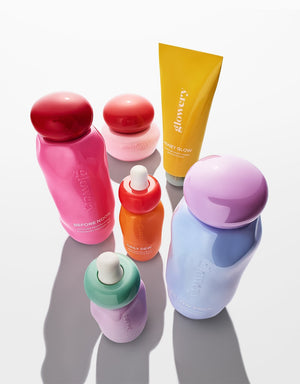The truth about
anti-aging products
by Margot, with the help of our dearest facialist :)
We’ve all heard it: "Start using anti-aging products in your 20s to prevent wrinkles." But is that really necessary, and does it even suit young skin? It’s time to unlock the myths around anti-aging skincare.
With the rise of Korean beauty and countless influencers telling us what we should be using, it’s easy to get caught up in the hype. But here's the truth: not every anti-aging product is made for everyone, and many of these trendy treatments might not be right for your skin , especially if you're in your teens or 20s.

The anti-aging myth: start early for prevention
The idea of anti-aging has long been ingrained in our beauty routines. From the age of 20, we’re told to start anti-aging treatments to prevent wrinkles. But did you know that the best anti-aging skincare isn't always about prevention? It’s about taking care of the skin you have right now, rather than overloading it with unnecessary ingredients.
Many products marketed as “anti-aging” contain retinol or other potent actives that may be too harsh for young skin. When used too early, these ingredients can strip the skin’s natural moisture and barrier, causing more harm than good.
What does young Skin really need?
Anti-aging products may be too intense for younger skin, but that doesn’t mean you should skip skincare altogether. Young skin requires hydration, protection, and barrier reinforcement, all key to maintaining healthy, youthful skin for years to come.
Focus on products that support the skin’s natural processes. In fact, Korean beauty has long emphasized a gentle, skin-loving approach with hydrating toners, calming serums, and nourishing oils. These products offer deep hydration without clogging pores or irritating the skin.
Why you shouldn’t rush into anti-aging products
It’s tempting to start using anti-aging skincare early, but your skin doesn’t need heavy-duty treatments just yet. Instead, focus on preventative care by nurturing and protecting your skin from the sun and environmental stressors. SPF, for instance, should be your first and most important anti-aging product. Applying SPF daily is one of the best ways to protect your skin from sun damage, which is a leading cause of premature aging.
Remember, “less is more” (As Alexandra Kolasinski always says!) when it comes to younger skin. Stick with lightweight, hydrating products and be mindful of introducing overly active ingredients like retinol too soon. Focus on ingredients that enhance your skin’s natural barrier, such as ceramides, hyaluronic acid, and vitamin C. These will protect, hydrate, and promote skin health without disrupting its delicate balance.
When should you start using anti-aging products?
As you age, your skin’s needs change. In your late 20s or early 30s, your skin may start to show early signs of aging, like fine lines or sunspots. That’s when you can consider introducing anti-aging products like retinol or peptides, which can boost collagen production and improve skin texture.
Until then, focus on nourishing and hydrating your skin, ensuring it remains healthy and protected. The best anti-aging routine starts with maintaining balance, rather than rushing into harsh treatments.
The Bottom Line: skip the anti-aging rush
The anti-aging trend isn’t the same for everyone. While you may be tempted to start early, young skin has different needs. Focus on products that hydrate, soothe, and protect rather than diving straight into the world of anti-aging. Trust your skin, and know that protecting and caring for it today will give you a glowing, youthful complexion for years to come.
Anti-aging isn’t just about using the right products, it’s about understanding what your skin needs at every stage of life.











